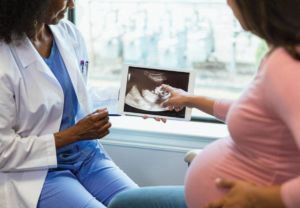 Improving Maternal & Fetal Health
Improving Maternal & Fetal Health
Through ultrasound education, training, certification, and ongoing proficiency, Inteleos and its partners will reduce maternal mortality in Kenya by 10% in five years. This endeavor is in direct alignment with the United Nations Sustainable Development Goal 3.1: “By 2030, reduce the global maternal mortality ratio to less than 70 per 100,000 live births.”
Inteleos, a trusted nonprofit and convener, and in partnership with in-country and regional partners, is building an infrastructure for ultrasound training, certification and continued proficiency for maternal-fetal clinical providers. The results and outcomes of this program will become a standard within the Kenyan healthcare system and serve as a model for others as a methodology to reduce maternal mortality while increasing socioeconomic impacts throughout Low to Middle Income Countries (LMICs).
Working for Africa, By Africa
Inteleos is working with the Kenyan Ministry of Health, Kenya Healthcare Federation, Amref International University, University of Nairobi and HealthEd Global, to integrate training and certification standards, and provide a sustainable in-country model for continuing proficiency within the Kenyan healthcare system.
Kenyan Maternal Health by the Numbers
As of 2017, maternal mortality in Kenya:
- 50.22 million population, 25.27 million women
- 342 women died per 100,000 births
- 5,000 maternal deaths = .02% of female population
The Opportunity
As of 2018, there were 1.2 midwives and clinical officers in Kenya per 1000 people. There are approximately 60,000 midwives and clinical officers in all of Kenya who could benefit from validated and relevant Point of Care Ultrasound (POCUS) training and certification.
Sources:
https://data.worldbank.org/indicator/SH.MED.NUMW.P3?locations=KE
https://www.who.int/data/gho/data/themes/topics/health-workforce
By offering training, practice-relevant certification and ongoing professional development, there are opportunities for positive socioeconomic impact throughout the professional career of clinicians and their patient communities.
Shifting the Healthcare Infrastructure
- By educating and certifying midwives in the use of diagnostic ultrasound, patients receive efficient diagnosis and are put on the correct pathway to address their care needs.
- Jobs are created and local economies strengthened by creating additional personal and clinical practice opportunities that provide career growth for a predominantly female workforce.
- Nursing and midwifery leadership is strengthened throughout health and academic systems with validated skill sets to mitigate patient risk.
- Midwives and nurses are part of a collaborative team for women’s healthcare, resulting in positive health and economic impacts on healthcare institutions and communities.
- More patients are served and have broader access to ultrasound, working towards the WHO recommendation that every pregnant person receive at least one ultrasound prior to 24 weeks gestation.
- Ultimately, healthier beneficiaries of care, women, are able to invest in and support the local and national economy during their lifetimes and for generations to come.
There is a unique mission-based opportunity to do something that has yet to be done at this scale. For the first time, required stakeholders in Kenya agree and are mandated by the Ministry of Health to ensure midwives, nurses and clinical officers are educated, trained and certified to be proficient in the use of point of care ultrasound for maternal scans. Organizations, government, regulators and associations are working together to ensure the right policies are in place for task expansion and increased access to needed care.
Education and curriculum will be standardized at a national scale, and the use of ever-increasingly available ultrasound devices will expand to include those providing primary care to women. This model of policy change, standardization and implementation of effective education, training and relevant certification can then be scaled to other countries and regions around world.
To learn more, partner or donate, visit our UPGC Maternal Fetal Health page.






